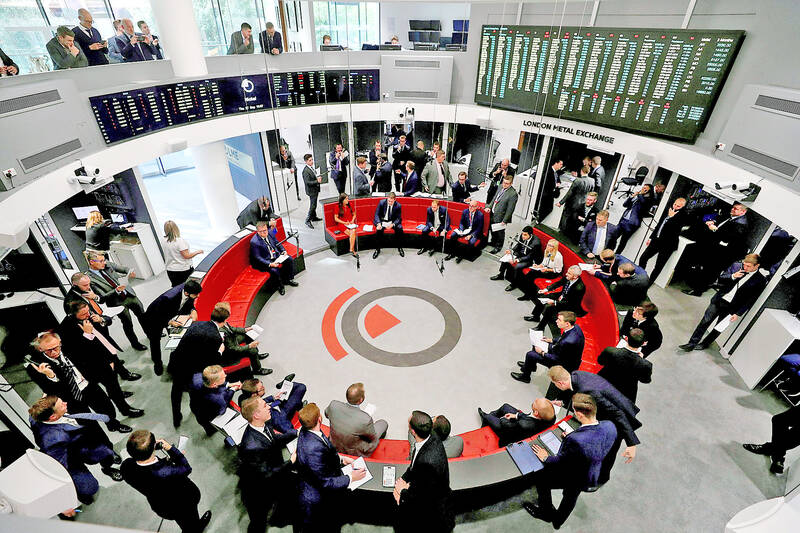London Metal Exchange (LME) trading data on Friday briefly showed a 77 percent drop in the global benchmark price for copper after its system transmitted incorrect pricing, in the latest technical setback at the embattled exchange.
The error came at the close of trading in the LME’s second open-outcry pricing session, which sets the global benchmark price for the physical metals industry. The mistake was a result of a data-entry error, a person familiar with the matter said.
While the final price in the trading ring was set at US$9,130 per tonne, the LME’s external data feed showed a price of US$2,130 per tonne.

Photo: Reuters
In a subsequent notice, the LME asked data vendors to update their pricing feeds accordingly, and apologized for any inconvenience caused.
The glitch had no follow-on effect on prices or trading and was quickly resolved by the LME.
The episode marks the latest in a string of technical setbacks at the exchange, including several complications that arose when it resumed trading in the wake of last year’s historic nickel squeeze.
In the run-up to the crisis in March last year, its clearinghouse also generated a “high number” of erroneous margin calls that for some brokers totaled hundreds of millions of dollars.
At the start of last year, it also experienced a five-hour outage impacting its electronic trading platform, where about one-third of trading takes place. The remainder takes place in a telephone-based interoffice market, in addition to a small volume of trades in the “Ring.”
The fallout from the nickel crisis raised questions about its future at the center of global metals markets.
Copper on the LME settled at US$9,187 per tonne, up 0.68 percent. In the US, copper for March delivery rose US$0.02 to US$4.22 per pound, rising 7.93 percent from last week’s US$3.91 per pound.
In other commodities:
‧ Gold for February delivery rose US$22.90 to US$1,921.70 per ounce, gaining 2.78 percent from last week’s US$1,869.70 per ounce.
‧ Silver for March delivery rose US$0.37 to US$24.37 per ounce, rising 1.62 percent from last week’s US$23.98 per ounce.
Additional reporting by AP

With an approval rating of just two percent, Peruvian President Dina Boluarte might be the world’s most unpopular leader, according to pollsters. Protests greeted her rise to power 29 months ago, and have marked her entire term — joined by assorted scandals, investigations, controversies and a surge in gang violence. The 63-year-old is the target of a dozen probes, including for her alleged failure to declare gifts of luxury jewels and watches, a scandal inevitably dubbed “Rolexgate.” She is also under the microscope for a two-week undeclared absence for nose surgery — which she insists was medical, not cosmetic — and is

CAUTIOUS RECOVERY: While the manufacturing sector returned to growth amid the US-China trade truce, firms remain wary as uncertainty clouds the outlook, the CIER said The local manufacturing sector returned to expansion last month, as the official purchasing managers’ index (PMI) rose 2.1 points to 51.0, driven by a temporary easing in US-China trade tensions, the Chung-Hua Institution for Economic Research (CIER, 中華經濟研究院) said yesterday. The PMI gauges the health of the manufacturing industry, with readings above 50 indicating expansion and those below 50 signaling contraction. “Firms are not as pessimistic as they were in April, but they remain far from optimistic,” CIER president Lien Hsien-ming (連賢明) said at a news conference. The full impact of US tariff decisions is unlikely to become clear until later this month

GROWING CONCERN: Some senior Trump administration officials opposed the UAE expansion over fears that another TSMC project could jeopardize its US investment Taiwan Semiconductor Manufacturing Co (TSMC, 台積電) is evaluating building an advanced production facility in the United Arab Emirates (UAE) and has discussed the possibility with officials in US President Donald Trump’s administration, people familiar with the matter said, in a potentially major bet on the Middle East that would only come to fruition with Washington’s approval. The company has had multiple meetings in the past few months with US Special Envoy to the Middle East Steve Witkoff and officials from MGX, an influential investment vehicle overseen by the UAE president’s brother, the people said. The conversations are a continuation of talks that

CHIP DUTIES: TSMC said it voiced its concerns to Washington about tariffs, telling the US commerce department that it wants ‘fair treatment’ to protect its competitiveness Taiwan Semiconductor Manufacturing Co (TSMC, 台積電) yesterday reiterated robust business prospects for this year as strong artificial intelligence (AI) chip demand from Nvidia Corp and other customers would absorb the impacts of US tariffs. “The impact of tariffs would be indirect, as the custom tax is the importers’ responsibility, not the exporters,” TSMC chairman and chief executive officer C.C. Wei (魏哲家) said at the chipmaker’s annual shareholders’ meeting in Hsinchu City. TSMC’s business could be affected if people become reluctant to buy electronics due to inflated prices, Wei said. In addition, the chipmaker has voiced its concern to the US Department of Commerce